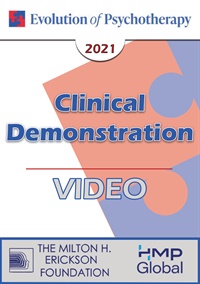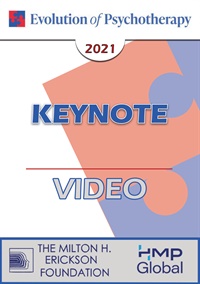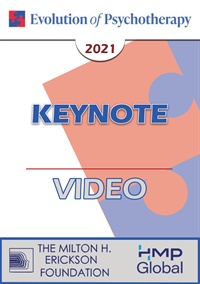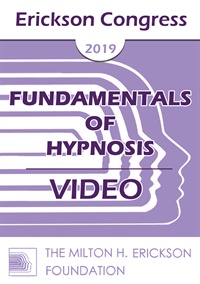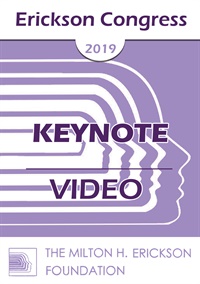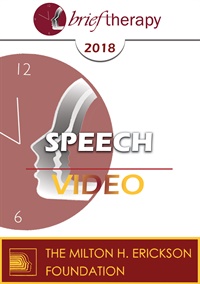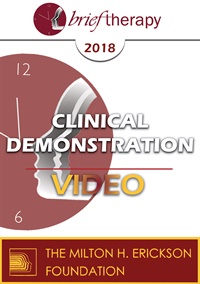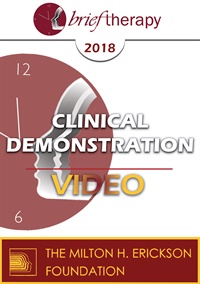- Average Rating:
- Not yet rated
- Topic Areas:
- Clinical Demonstrations | Generative Psychotherapy | Psychotherapy | Art and Creativity
- Categories:
- Evolution of Psychotherapy | Evolution of Psychotherapy 2021
- Faculty:
- Stephen Gilligan, PhD
- Course Levels:
- Master Degree or Higher in Health-Related Field
- Duration:
- 1 hour
- Format:
- Audio and Video
- Original Program Date:
- Dec 02, 2021
- Short Description:
- "This demonstration will show how activating a client's creative process is the key factor in generative psychotherapy. This process follows these steps: (1) Opening a creative safe space (2) Identifying a goal (A positive change or transforming a negative pattern) (3) Identifying and welcoming both obstacles and resources (4) Weaving and integrating the parts into a new "mosaic of self" (5) Orienting to future application of changes. Therapy is successful when clients are able to experientially realize positive life changes. While the identification and transformation of symptoms is important in this regard, the activation of the client's creative capacity to change is even more important. This paper outlines 6 steps in this therapeutic process: (1) opening a mindful field, (2) setting positive intentions, (3) developing and maintaining a creative state, (4) identifying a "storyboard" for achieving goals, (5) transforming negative experiences, and (6) everyday practices. Metho
- Price:
- $59.00 - Base Price
- Average Rating:
- Not yet rated
- Topic Areas:
- Art and Creativity | Keynotes | Therapist Development
- Categories:
- Evolution of Psychotherapy | Evolution of Psychotherapy 2021
- Faculty:
- Rob Kapilow
- Course Levels:
- Master Degree or Higher in Health-Related Field
- Duration:
- 1 hour
- Format:
- Audio and Video
- Original Program Date:
- Dec 02, 2021
- Short Description:
- "At the heart of psychotherapy is the idea that listening to someone is an inherently healing act. Can an understanding of the grammar of music help us better understand the grammar of how therapists can listen better and even advance therapeutic communication? Join NPR and PBS commentator Rob Kapilow a conductor/composer/author for a unique interactive exploration inside the language of music to see how it can help us learn to listen and communicate. Conducted by Kapilow musicians will play the final two movements of Haydn’s string quartet op 76/5. Learn to listen like Haydn. Learn the evocative grammar that underlies music.
- Price:
- $59.00 - Base Price
- Average Rating:
- Not yet rated
- Topic Areas:
- Art and Creativity | Keynotes | Psychotherapy
- Categories:
- Evolution of Psychotherapy | Evolution of Psychotherapy 2021
- Faculty:
- Irvin Yalom, PhD
- Course Levels:
- Master Degree or Higher in Health-Related Field
- Duration:
- 1 hour
- Format:
- Audio and Video
- Original Program Date:
- Dec 01, 2021
- Short Description:
- A Keynote featuring Irvin Yalom, PhD, from the 2021 Evolution of Psychotherapy Conference.
- Price:
- $59.00 - Base Price
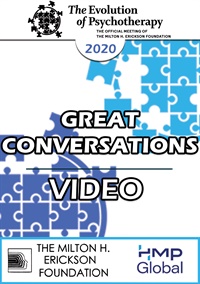
- Average Rating:
- Not yet rated
- Topic Areas:
- Gestalt | Great Conversations | Ericksonian Hypnosis and Therapy Techniques | Experiential Therapy | Psychotherapy | Art and Creativity
- Categories:
- Evolution of Psychotherapy | Evolution of Psychotherapy 2020
- Faculty:
- Erving Polster, PhD | Jeffrey Zeig, PhD
- Course Levels:
- Master Degree or Higher in Health-Related Field
- Duration:
- 1 hour
- Format:
- Audio and Video
- Original Program Date:
- Dec 11, 2020
- Short Description:
- Poetry and Presence: Each can lead to client change. This session explores the intersection of two experiential methods, gestalt practice and Ericksonian therapy.
- Price:
-
Sale is $29.00
price reduced from Base Price - $59.00
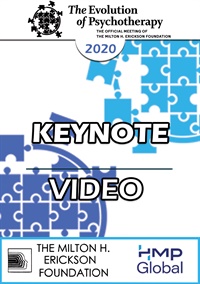
- Average Rating:
- Not yet rated
- Topic Areas:
- Art and Creativity | Training | Keynotes | Psychotherapy | Music | Therapist Development
- Bundle(s):
- EP20 Highlights
- Categories:
- Evolution of Psychotherapy | Evolution of Psychotherapy 2020
- Faculty:
- Jeffrey Zeig, PhD | Rob Kapilow
- Course Levels:
- Master Degree or Higher in Health-Related Field
- Duration:
- 1 hour 5 minutes
- Format:
- Audio and Video
- Original Program Date:
- Dec 10, 2020
- Short Description:
- At the heart of psychotherapy is the idea that listening to someone is an inherently healing act. Can an understanding of the grammar of music help us better understand the grammar of how patients communicate? Join NPR and PBS commentator Rob Kapilow for a unique exploration inside the language of music to see if it can help us learn to listen.
- Price:
-
Sale is $29.00
price reduced from Base Price - $59.00
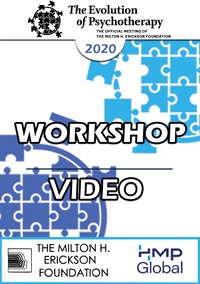
- Average Rating:
- Not yet rated
- Topic Areas:
- Trauma | Workshops | Art and Creativity | Social Psychology | Polyvagal Theory | Psychotherapy | Music | Psychology
- Categories:
- Evolution of Psychotherapy | Evolution of Psychotherapy 2020
- Faculty:
- Stephen Porges, PhD
- Course Levels:
- Master Degree or Higher in Health-Related Field
- Duration:
- 2 hours
- Format:
- Audio and Video
- Original Program Date:
- Dec 09, 2020
- Short Description:
- This presentation will focus on how Polyvagal Theory provides a plausible model to explain how and why intonation of voice and vocal music can support mental and physical health and enhance function during compromised states associated with illness, chronic stress, and trauma. The workshop will elaborate on the principles incorporated in the Safe and Sound Protocol™ and the lessons learned through preliminary clinical trials, current research, and feedback from clinicians applying the protocol to various clinical disorders including individuals with severe trauma histories.
- Price:
-
Sale is $29.00
price reduced from Base Price - $59.00
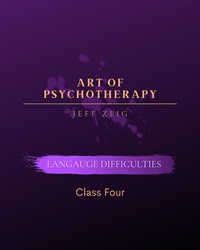
- Average Rating:
- Not yet rated
- Topic Areas:
- Clinical Demonstrations | Experiential Therapy | Psychotherapy | Therapist Development | Art and Creativity | Ericksonian Psychotherapy | Art of Psychotherapy
- Bundle(s):
- Art of Psychotherapy - Experiential Series
- Categories:
- Art of Psychotherapy
- Faculty:
- Jeffrey Zeig, PhD
- Course Levels:
- Master Degree or Higher in Health-Related Field
- Duration:
- 2 Hours 15 Minutes
- Format:
- Audio and Video
- Original Program Date:
- Jun 07, 2020
- Short Description:
- In our final class of this series, our demonstration subject has an impediment in learning the German language.
- Price:
- $79.00 - Base Price
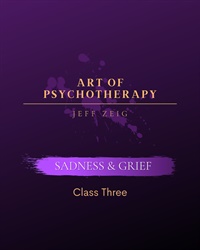
- Average Rating:
- Not yet rated
- Topic Areas:
- Clinical Demonstrations | Experiential Therapy | Grief | Psychotherapy | Therapist Development | Art and Creativity | Ericksonian Psychotherapy | Art of Psychotherapy
- Bundle(s):
- Art of Psychotherapy - Experiential Series
- Categories:
- Art of Psychotherapy
- Faculty:
- Jeffrey Zeig, PhD
- Course Levels:
- Master Degree or Higher in Health-Related Field
- Duration:
- 2 hours 22 minutes
- Format:
- Audio and Video
- Original Program Date:
- May 31, 2020
- Short Description:
- The presenting problem for Class 3 is an issue with expressing sadness and grief.
- Price:
- $79.00 - Base Price
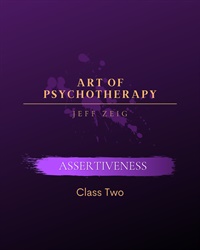
- Average Rating:
- Not yet rated
- Topic Areas:
- Clinical Demonstrations | Experiential Therapy | Psychotherapy | Therapist Development | Art and Creativity | Ericksonian Psychotherapy | Art of Psychotherapy
- Bundle(s):
- Art of Psychotherapy - Experiential Series
- Categories:
- Art of Psychotherapy
- Faculty:
- Jeffrey Zeig, PhD
- Course Levels:
- Master Degree or Higher in Health-Related Field
- Duration:
- 2 Hours 25 Minutes
- Format:
- Audio and Video
- Original Program Date:
- May 24, 2020
- Short Description:
- Our demonstration subject for Class 2 is a psychiatrist who would like to become a better leader.
- Price:
- $79.00 - Base Price
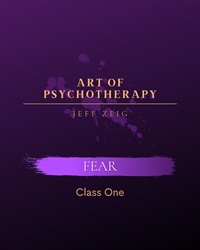
- Average Rating:
- Not yet rated
- Topic Areas:
- Experiential Therapy | Clinical Demonstrations | Phobia | Psychotherapy | Therapist Development | Art and Creativity | Ericksonian Psychotherapy | Art of Psychotherapy
- Bundle(s):
- Art of Psychotherapy - Experiential Series
- Categories:
- Art of Psychotherapy
- Faculty:
- Jeffrey Zeig, PhD
- Course Levels:
- Master Degree or Higher in Health-Related Field
- Duration:
- 2 Hours 5 Minutes
- Format:
- Audio and Video
- Original Program Date:
- May 17, 2020
- Short Description:
- The presenting problem for Class 1 is fear.
- Price:
- $79.00 - Base Price
- Average Rating:
- Not yet rated
- Topic Areas:
- Fundamentals of Hypnosis | Trance | Hypnosis | Art and Creativity | Communication
- Categories:
- Erickson Congress | Erickson Congress 2019
- Faculty:
- Stephen Gilligan, PhD
- Course Levels:
- Master Degree or Higher in Health-Related Field
- Duration:
- 1 Hour 51 Minutes
- Format:
- Audio and Video
- Original Program Date:
- Dec 15, 2019
- Short Description:
- In therapeutic trance, a person releases from rigid ego positions, thereby opening to the resources and healing capacities of the creative unconscious. In this process, nonverbal communications—such as limbic resonance, felt sense, somatic centering, and musicality—are of central importance. The workshop explores how therapists may attune to these nonverbal patterns and utilize them to develop and guide creative trance work.
- Price:
-
Sale is $29.00
price reduced from Base Price - $59.00
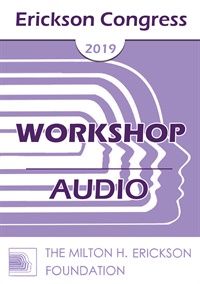
- Average Rating:
- Not yet rated
- Topic Areas:
- Workshops | Art and Creativity | Hypnosis | Hypnotherapy | Music
- Categories:
- Erickson Congress | Erickson Congress 2019
- Faculty:
- Norma Barretta, PhD | Jolie Barretta
- Duration:
- 1 Hour 55 Minutes
- Format:
- Audio Only
- Original Program Date:
- Dec 15, 2019
- Short Description:
- Hypnosis can interrupt dysfunctional loops, breaking negative patterns. With the skillful addition of sound that process is often speeded up and has a profound effect physiologically as well as psychologically, influencing and entraining the biological state of the subject. Participants will be shown how to enhance their awareness of tonality, volume, and the power inherent in vowel sounds. Using frequencies to deepen trance will be part of the group experience.
- Price:
- $15.00 - Base Price
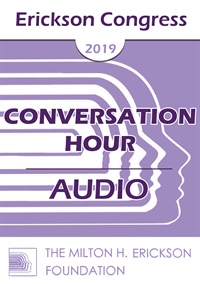
- Average Rating:
- Not yet rated
- Topic Areas:
- Conversation Hours | Art and Creativity | Communication | Humor
- Categories:
- Erickson Congress | Erickson Congress 2019
- Faculty:
- Michael Hoyt, PhD
- Duration:
- 1 Hour 3 Minutes
- Format:
- Audio Only
- Original Program Date:
- Dec 14, 2019
- Short Description:
- For many, Erickson set the prototypical example of how to be creative and often evoked a You Said What?! (YSW?!) reaction from clients and students. As we describe in the new book, Creative Therapy in Challenging Situations: Unusual Interventions to Help Clients (Hoyt & Bobele, 2019), such YSW?! interventions are particularly useful and effective when approaching unusual client problems.
- Price:
- $15.00 - Base Price
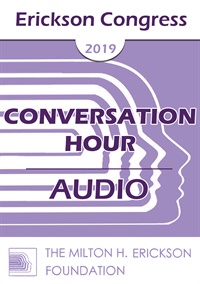
- Average Rating:
- Not yet rated
- Topic Areas:
- Conversation Hours | Art and Creativity | Hypnosis
- Categories:
- Erickson Congress | Erickson Congress 2019
- Faculty:
- Carol Kershaw, EdD | Bill Wade, PhD
- Duration:
- 59 Minutes
- Format:
- Audio Only
- Original Program Date:
- Dec 14, 2019
- Short Description:
- Explore the latest research in optimal functioning, creativity, and flow and how to help clients achieve this state more frequently.
- Price:
- $15.00 - Base Price
Tags: Art and Creativity Hypnosis
- Average Rating:
- Not yet rated
- Topic Areas:
- Keynotes | Psychotherapy | Generative Psychotherapy | Art and Creativity | Relationships
- Categories:
- Erickson Congress | Erickson Congress 2019
- Faculty:
- Robert Dilts, BA
- Course Levels:
- Master Degree or Higher in Health-Related Field
- Duration:
- 1 Hour 4 Minutes
- Format:
- Audio and Video
- Original Program Date:
- Dec 13, 2019
- Short Description:
- The core focus in Generative Change is creativity: How do you create a positive relationship with others and yourself—your body, your past, your future, your wounds, and your gifts? To accomplish this, a person’s state of consciousness is the difference that makes the difference. Generative Change work involves building the generative states, for yourself and others, needed to make significant change. It then focuses on how to maintain these states in order to reach meaningful goals and transform challenging obstacles. This presentation will explore how the six steps of Generative Change may be applied to Psychotherapy.
- Price:
-
Sale is $29.00
price reduced from Base Price - $59.00
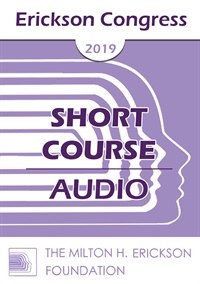
- Average Rating:
- Not yet rated
- Topic Areas:
- Short Courses | Art and Creativity | Attunement | Improvisation | Psychotherapy
- Categories:
- Erickson Congress | Erickson Congress 2019
- Faculty:
- Paul Leslie, Ed.D.
- Duration:
- 1 Hour 11 Minutes
- Format:
- Audio Only
- Original Program Date:
- Dec 12, 2019
- Short Description:
- In this training you will learn the factors which lead to creating alive and inspired therapy sessions regardless of theoretical orientation. Drawing from such diverse sources as indigenous wisdom traditions and modern psychotherapy approaches, this training will demonstrate how embracing improvisation and utilization can revitalize and energize therapy sessions.
- Price:
- $15.00 - Base Price
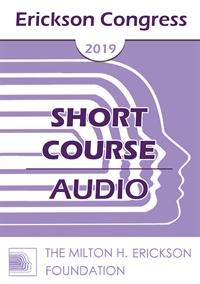
- Average Rating:
- Not yet rated
- Topic Areas:
- Short Courses | Art and Creativity | Hypnotherapy | Psychotherapy | Therapeutic Relationship | Therapist Development
- Categories:
- Erickson Congress | Erickson Congress 2019
- Faculty:
- Richard Hill, MBMSc, MEd, MA
- Duration:
- 1 Hour 30 Minutes
- Format:
- Audio Only
- Original Program Date:
- Dec 12, 2019
- Short Description:
- Hypnotherapy and psychotherapy have been developing over time through various phases. Directive therapies with an intervention orientation have shifted over the years to suggestive and client centered approaches. More recently both research and practice has opened our minds to relational and responsive approaches. The concept of “client responsiveness” is discussed in my book with Ernest Rossi, The Practitioner’s Guide to Mirroring Hands.
- Price:
- $15.00 - Base Price
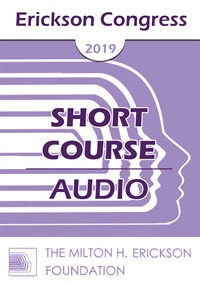
- Average Rating:
- Not yet rated
- Topic Areas:
- Short Courses | Art and Creativity | Hypnosis | Ericksonian Hypnosis and Therapy Techniques | Hypnotherapy | Music | Attunement
- Categories:
- Erickson Congress | Erickson Congress 2019
- Faculty:
- Anita Jung, M.S.
- Duration:
- 1 Hour 27 Minutes
- Format:
- Audio Only
- Original Program Date:
- Dec 12, 2019
- Short Description:
- The Greek philosopher Pythagoras was among the first to recognize the healing powers of music. Milton Erickson, the musician of mind, body and soul, was the first to structure communication for greatest effect so that clients could change many aspects of their life, not merely their presenting symptoms. Just as the cadence of voice and patterns of speech form the music of Ericksonian communication, repetition and rhythm create the emergence of a trance state in music, film, and in poetry. The utilization of art and creativity in a hypnotherapy model functions as a catalyst accentuating the nuances of core competencies such as tailoring, utilization, strategic approach, and destabilization.
- Price:
- $15.00 - Base Price
Credit available - Click Here for more information
- Average Rating:
- Not yet rated
- Topic Areas:
- Speeches | Psychotherapy | Art and Creativity | Brief Therapy | Resources
- Categories:
- Brief Therapy Conference | Brief Therapy Conference 2018 | Online Continuing Education
- Faculty:
- Stephen Gilligan, PhD
- Course Levels:
- Master Degree or Higher in Health-Related Field
- Duration:
- 1:01:12
- Format:
- Audio and Video
- Original Program Date:
- Dec 09, 2018
- Short Description:
- Therapy is successful when clients are able to experience significantly changed realities. While the identification and transformation of symptoms is important in this regard, the activation of the client's creative capacity to make positive changes is even more important. This paper will explore how the 6-step model of Generative Psychotherapy provides a disciplined yet flexible process for helping clients claim and use their agency for creative change.
- Price:
-
Sale is $29.00
price reduced from Base Price - $59.00
Credit available - Click Here for more information
- Average Rating:
- Not yet rated
- Topic Areas:
- Clinical Demonstrations | Psychotherapy | Generative Psychotherapy | Art and Creativity | Brief Therapy
- Categories:
- Brief Therapy Conference | Brief Therapy Conference 2018 | Online Continuing Education
- Faculty:
- Stephen Gilligan, PhD
- Course Levels:
- Master Degree or Higher in Health-Related Field
- Duration:
- 57:55
- Format:
- Audio and Video
- Original Program Date:
- Dec 08, 2018
- Short Description:
- This live demonstration will show the 6-step model for generative change: (1) opening a creative space, (2) setting a positive intention, (3) developing a creative state, (4) taking action steps, (5) transforming obstacles, and (6) homework and self-practices.
- Price:
-
Sale is $29.00
price reduced from Base Price - $59.00
Credit available - Click Here for more information
- Average Rating:
- Not yet rated
- Topic Areas:
- Clinical Demonstrations | Continuing Education | Love | Art and Creativity | Brief Therapy | Couples Therapy | Memory | Attachment | Therapist Techniques
- Categories:
- Brief Therapy Conference | Brief Therapy Conference 2018 | Online Continuing Education | Pioneers in Couples and Family Therapy
- Faculty:
- Stan Tatkin, PsyD, MFT
- Course Levels:
- Master Degree or Higher in Health-Related Field
- Duration:
- 1:00:43
- Format:
- Audio and Video
- Original Program Date:
- Dec 08, 2018
- Short Description:
- This clinical demonstration showcases the Lovers Pose, a powerful somatic intervention in couple therapy designed to access and repair implicit memory and early attachment wounds. The pose draws on archetypal postures—caregiver-infant, inner child, and even the Pietà—placing partners in intentional roles guided by the therapist. With sustained eye contact and physical closeness, it induces a parasympathetic state that fosters emotional co-regulation, physiological attunement, and deep relational healing.
- Price:
-
Sale is $29.00
price reduced from Base Price - $59.00
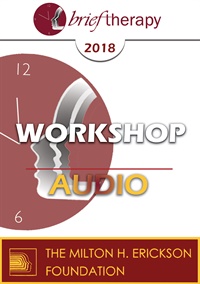
- Average Rating:
- Not yet rated
- Topic Areas:
- Workshops | Hypnosis | Art and Creativity | Brief Therapy | Music | Therapist Development
- Categories:
- Brief Therapy Conference | Brief Therapy Conference 2018
- Faculty:
- Norma Barretta, PhD | Jolie Barretta
- Duration:
- 1:54:14
- Format:
- Audio Only
- Original Program Date:
- Dec 07, 2018
- Short Description:
- We have much evidence that certain sounds reduce stress and pain and aid sleep. Now we are finding that certain sounds speed up the healing process...physiologically as well as mentally and emotionally. When added to hypnosis, the effects are exponential. We will demonstrate various sounds and frequencies and discuss their applications to various health conditions. We will show some graphic visuals of sounds and differences between harmonic sound and distorted sound and how those differences affect us. We presuppose therefore, that the tonal quality and the vibrations in the words produced by the VOICE of the therapist are a factor in the therapeutic process. Adding specific sounds as background enhances and speeds up the healing we seek in therapy sessions. Sound, music and frequencies may indeed be part of the medicine of the future.
- Price:
- $15.00 - Base Price
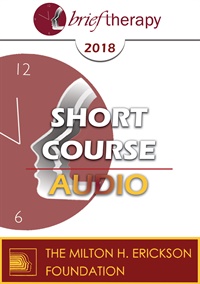
- Average Rating:
- Not yet rated
- Topic Areas:
- Short Courses | Brief Therapy | Art and Creativity | Psychotherapy | Solution Oriented Approach
- Categories:
- Brief Therapy Conference | Brief Therapy Conference 2018
- Faculty:
- George Ferrick, MA
- Duration:
- 1:24:31
- Format:
- Audio Only
- Original Program Date:
- Dec 06, 2018
- Short Description:
- This workshop will describe strategies and approaches adapted from brief and solution focused therapy. These enhanced mediation with creative ways to set a tone and reduce anxiety and resistance; to give voice to participants while getting to the heart of the matter; to unlock narrow positions, break through impasses, move to broader viewpoints, and co-create solutions.
- Price:
- $15.00 - Base Price
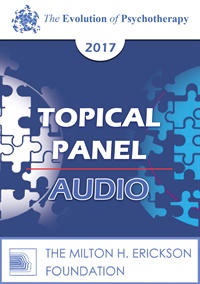
- Average Rating:
- Not yet rated
- Topic Areas:
- Topical Panels | Art and Creativity | Neurobiology | Psychotherapy | Communication
- Categories:
- Evolution of Psychotherapy | Evolution of Psychotherapy 2017
- Faculty:
- Jean Houston, PhD | Scott Miller, PhD | Daniel Siegel, MD
- Duration:
- 1:01:30
- Format:
- Audio Only
- Original Program Date:
- Dec 16, 2017
- Short Description:
- Psychotherapy is an amalgamation of science and art. All we’ve can be created that amalgamates the art of effective therapeutic communication and empirically validated orientations.
- Price:
- $15.00 - Base Price
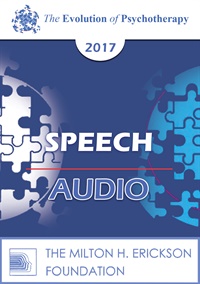
- Average Rating:
- Not yet rated
- Topic Areas:
- Speeches | Psychotherapy | Art and Creativity | Consciousness
- Bundle(s):
- Learning Track - EP17 Erickson Download
- Categories:
- Evolution of Psychotherapy | Evolution of Psychotherapy 2017 | Evolution of Psychotherapy Erickson Learning Track
- Faculty:
- Ernest Rossi, PhD | Kathryn Rossi, PhD
- Duration:
- 1:00:52
- Format:
- Audio Only
- Original Program Date:
- Dec 16, 2017
- Short Description:
- An Introduction to the facts and fallacies of how the Quantum World View could facilitate the Evolution of Psychotherapy by integrating the best insights of the arts, humanities and sciences to support people, cultures and nations to become the best they can be.
- Price:
- $15.00 - Base Price


